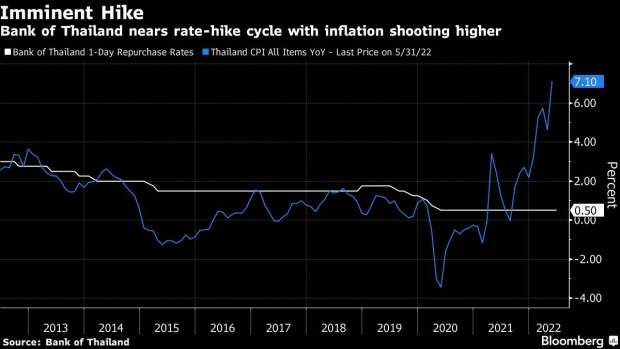Jun 27, 2022
Thai Central Bank for Timely Policy Tweaks as Inflation Soars
, Bloomberg News

(Bloomberg) -- Thailand’s central bank signaled an imminent rate increase, saying timely monetary policy adjustment in line with changing economic and price trends will help steer broader inflation expectations.
Gradual rate hikes will not derail an economic recovery given the real negative interest rates stemming from “ultra low” policy rate and high inflation, Bank of Thailand officials said on Monday. They ruled out an off-cycle rate hike, saying the three remaining meetings of the rate-setting panel for this year were appropriate.
The Monetary Policy Committee left the key rate unchanged at a record low 0.5% for a 16th straight meeting in a split decision early this month despite inflation at a 14-year high. But pressure has mounted on the rate panel since to hike sooner than later after the nation’s currency extended a slump and the US Federal Reserve hiked the rate by 75 basis points this month.
Raising interest rate will not obstruct economic recovery, but will help align rates in line with the economic situation, BOT’s Senior Director Surach Tanboon said at a meeting with analysts.
The central bank “can’t take for granted” that inflation expectations will remain anchored over a 5-10 year period, Surach said, adding that it needs to assure the public that price surge has been taken care of to temper inflation expectations.
Headline inflation in Thailand has stayed well above the official 1%-3% target range this year, hitting 7.1% in May, the highest since 2008. BOT has raised its average CPI forecast for this year to 6.2%, citing higher fuel and food prices stemming from supply-chain disruptions caused by the Ukraine war.
Any Thai rate adjustment will be data-driven, and BOT doesn’t view interest rate as a “hero” to curb inflation, Assistant Governor Piti Disyatat said at the same briefing. CPI will fall next year with the easing of global supply shocks, he said.
The Bank of Thailand may need to raise the rate by 50 basis points this year, or “even more aggressive than that,” depending on the Federal Reserve’s next move, Korn Chatikavanij, a former finance minister, said last week.
BOT officials said the decline in the baht was in line with other regional currencies and short-term interest rate differential was just one factor affecting the currency. The Thai currency may strengthen in the medium term with a domestic economic recovery gathering momentum and the market pricing in future Fed tightening, Piti said.
Still, the central bank will continue to monitor the baht closely, he said.
©2022 Bloomberg L.P.





